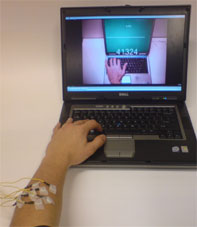
Learn skills without lifting a finger
Do you want to improve your touch typing? Learn carpentry? Play a guitar, piano or violin? Learn to Tango? Juggle? Surf? Improve your tennis serve – or golf swing? Learn some martial arts moves? Snowboard? Knit?
Van Der Werf and his colleagues at the Department of Sleep and Cognition, Netherlands Institute for Neuroscience, revealed a remarkable and very valuable technique for efficiently learning skills like these – without moving a finger!
Here is some background to their work:
Many studies have now shown the benefits of sleep on enhancing learning and memory. One of the most striking findings is the improvement of motor skills after a period of sleep following deliberate practice or training.
Psychologists call motor skills ‘procedural knowledge’. This includes learning to ride a bike, learning to touch type, learning to play a musical instrument or learning the skills of a sport or activity such as swimming, tennis, or martial arts. Gaining procedural knowledge may be contrasted with gaining what is called ‘declarative knowledge’. Declarative knowledge is facts and information.
While there is some evidence that learning new declarative knowledge benefits from sleep as long as it occurs within a limited time window after first coming across the information, there is a great deal of evidence demonstrating that practicing new skills benefits from sleep, even if the sleep is delayed up to 10 hours after practice. After practice, the sleep gains are as great 10 hours after practice as they are if you sleep immediately after practice.
But practice takes work! And everyone knows that practice works wonders. What about just observing someone displaying the skill you want to pick up? This is what Van Der Werf looked at in his study.
The skill used in the study was a finger tapping task, in which tapping required coordinating a sequence of taps with a string of numbers. While this might not sound like its representative of playing the guitar or learning to Tango, from the point of view of what occurs in the brain it is similar: in all these skills, components of the actions have to be pieced together in a way that is fluid and effective, and whether the movement involves just the fingers, or arms, legs and hips, doesn’t make any difference to what is going on in the brain – they are all motor movements, coded in the same way.
Participants were instructed to watch an expert perform the finger tapping skill on a video. While they watched the skill being performed on the screen they had to press down on two keys on the keypad with the same fingers used in doing the skill. This was to prevent subconsciously reenacting the skill by twitching their finger muscles, providing the kind of sensory/muscle feedback you typically get while practicing for real. To double check, that there was no actual ‘practice’ going on, electrodes on the arm recorded the activity of the muscles controlling the fingers – and there wasn’t any. This set up is shown in the photo.

Results showed that immediate sleep (within e.g. 1-2 hours of watching the video) improved the speed of performance the next day by between 11-33% depending on the person, with an average improvement of 22%. Also, the error rate of the skill was reduced from between 23% – 61%, with an average improvement in accuracy of 42%. These are remarkable learning gains after just one night’s sleep. Just as big as the sleep benefits following actual practice! And the improvement was the same regardless of whether the participants were tested the following morning 12 hours later, or the following evening, 24 hours later. The learning effect didn’t drop off as the day went on.
So how do we know the new skill was because of the sleep? Because no performance gains occurred if the participants went to sleep more than 12 hours after watching the video!
Van Der Werf and his team conclude:
These findings could improve learning new motor skills in athletes and children, but also in patients having to remaster skills following stroke or injury.
But it’s not only athletes who can benefit from this trick. We all can if we have a skill we want to master. I love rock-climbing. I’m now going to be watching climbing videos just before going to sleep to improve my climbing skills! And I have a 2 year old daughter who is trying to learn how to build stairs with Lego. I’m going to show her how to do it before she goes to sleep.
Don’t forget, this kind of learning by watching doesn’t work unless you go to sleep soon after!
Reference
Van Der Werf et al. (2009). Learning by observation requires an early sleep window. PNAS, November 10, vol. 106 no. 45 18926-18930


